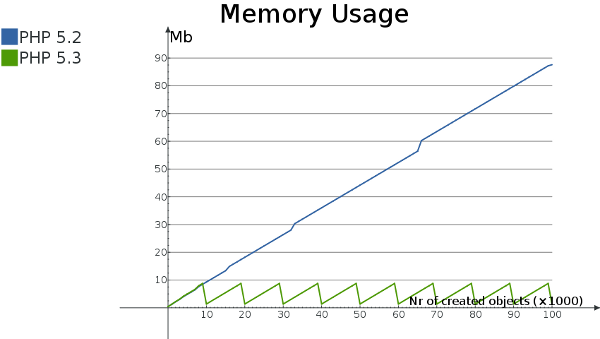Collecting Garbage: Performance Considerations
This is the third (and last) part of three-parts column that was originally published in the June 2009 issues of php|architect.
Part one is here and part two is here.
In the previous two parts of this column we have explored PHP's take on circular referenced variables and a mechanism that allows to clean up this particular problem with reference counted variable tracking. Of course, the implementation of the garbage collection mechanism in PHP 5.3 has some performance impacts. In this third and last part of the column I will cover the performance implications of the addition of this garbage collection mechanism.
We have already mentioned in the previous part that simply collecting the possible roots had a very tiny performance impact, but this is when you compare PHP 5.2 against PHP 5.3. Although the recording of possible roots compared to not recording them at all like in PHP 5.2 is slower, other changes to the PHP runtime in PHP 5.3 prevented this particular performance loss from even showing.
There are two major areas in which performance is effected. The first area is the allegedly reduced memory usage, and the second area are run-time delays when the garbage collection mechanism performs its memory cleanups. We will look at both of those issues.
Reduced Memory Usage
First of all, the whole idea of implementing the garbage collection mechanism is to reduce memory usage by cleaning up circular referenced variables as soon as the prerequisites are full-filled. In the implementation in PHP this happens as soon as the root-buffer is full, or when the function gc_collect_cycles() is called. In the first diagram we display the memory usage of the following script in both PHP 5.2 and PHP 5.3 excluding the base memory that PHP uses itself when it starts up:
<?php
class Foo
{
public $var = '3.1415962654';
}
$baseMemory = memory_get_usage();
for ( $i = 0; $i <= 100000; $i++ )
{
$a = new Foo;
$a->self = $a;
if ( $i % 500 === 0 )
{
echo sprintf( '%8d: ', $i ), memory_get_usage() - $baseMemory, "\n";
}
}
?>

In this very academic example we are creating an object of which a property is set to point back to the object itself. When the $a variable in the script is re-assigned in the next iteration of the loop, a memory leak would typically occur. In this case two zval-containers are leaked (the object zval, and the property zval), but only one possible root is found—the variable that was unset. When the root-buffer is full after 10.000 iterators (with in total 10.000 possible roots), the garbage collection mechanism kicks in and frees the memory associated with those possible roots. This can very clearly be seen in the jagged memory-usage graph for PHP 5.3. After each 10.000 iterations the mechanism kicks in and frees the memory associated with the circular referenced variables. The mechanism itself does not have to do a whole lot of work in this example, because the structure that is leaked is extremely simple. From the diagram above you see that the maximum memory usage in PHP 5.3 is about 9 Mb, whereas in PHP 5.2 the memory usage keeps increasing.
Run-Time Slowdowns
The second area where the garbage collection mechanism influences performance is when the garbage collection mechanism kicks in to free the "leaked" memory. In order to see how much this is, we slightly modify the previous script to allow for a larger number of iterations and the removal of the intermediate memory usage figures. The script now looks like:
<?php
class Foo
{
public $var = '3.1415962654';
}
for ( $i = 0; $i <= 1000000; $i++ )
{
$a = new Foo;
$a->self = $a;
}
echo memory_get_peak_usage(), "\n";
?>
We will run this script two times, once with the zend.enable_gc setting turned on, and once with it turned off:
time ~/dev/php/php-5.3dev/sapi/cli/php -dzend.enable_gc=0 \
-dmemory_limit=-1 -n part3-example2.php
# and
time ~/dev/php/php-5.3dev/sapi/cli/php -dzend.enable_gc=1 \
-dmemory_limit=-1 -n part3-example2.php
On my machine the first command seems to take consistently about 10.7 seconds, whereas the second command takes about 11.4 seconds. This is a slowdown of about 7%. However, the maximum amount of memory used by the script is reduced by 98% from 931Mb to 10Mb. This benchmark is not very scientific, or even representable for real-life applications, but it does demonstrate the memory usage benefits that this garbage collection mechanism provides. The good thing is that the slow down is always the same 7% (for this particular script), while the memory saving capabilities continue to save more and more memory the more circular references are found during the execution of the script.
Let's now have a look at non-academic situation. I first started looking for circular reference collecting algorithms when I found out that while running the tests of the eZ Components' Template component with PHPUnit I ended up swapping a lot, and rendering my machine useless in the process. In order to do some benchmarks for this article, I re-ran those same tests with an empty php.ini file to disable the overhead and memory allocation that Xdebug was creating while doing code-coverage analysis.
The memory usage dropped with 95% from 1.7Gb to 75Mb memory consumption and the run time as reported by PHPUnit increased from 2:17 for the non-GC enabled run to 2:33 for the GC enabled run—an increase of about 12%. However, with the non-GC enabled run, PHP sat there doing "nothing" for almost 15 seconds. Upon investigation with the Unix debugger GDB I noticed that those 15 seconds were all spend on freeing memory allocated for objects inside the PHP runtime. The actual time that the script ran was about the same in the end.
PHP's Internal GC Statistics
It is possible to coax a little bit more information about how the garbage collection mechanism is run from within PHP. But in order to do so, you will have to re-compile PHP to enable the benchmark and data-collecting code. You will have to set the CFLAGS environment variable to -DGC_BENCH=1 prior to running ./configure with your desired options. In case you have compiled PHP before, the following sequence should do the trick:
export CFLAGS=GC_BENCH=1 ./config.nice make clean make
When you run the above example code again with the newly built PHP binary, you will see the following being shown after PHP has finished execution:
GC Statistics
-------------
Runs: 110
Collected: 2072204
Root buffer length: 0
Root buffer peak: 10000
Possible Remove from Marked
Root Buffered buffer grey
-------- -------- ----------- ------
ZVAL 7175487 1491291 1241690 3611871
ZOBJ 28506264 1527980 677581 1025731
The most informative statistics are displayed in the first block. You can see here that the garbage collection mechanism ran 110 times, and in total more than 2 million memory allocations where freed during those 110 runs. As soon as the garbage collection mechanism has run at least one time, the "Root buffer peak" is always 10.000.
Conclusion
In this final and last installment we had a quick look at the performance implications of the garbage collection mechanism that is now part of PHP 5.3. In the general case, it will only cause a slow down when the cycle collecting algorithm actually runs, whereas in normal (smaller) scripts there should be no performance hit at all.
However, in the cases that the cycle collection mechanism does run for normal scripts, the memory reduction it will provide allows more of those scripts to run concurrently on your server as not so much memory is used in total.
The real benefits are only there for longer running scripts such as lengthy test suites or daemon scripts. Also, for PHP-GTK applications that generally tend to run longer than scripts for the Web, the new mechanism should make quite a bit of a difference regarding memory leaks creeping in over time.
Comments
Thanks for the great info, Derick.
I really enjoyed this 3 part series. It helped me to understand the PHP internals and how the GC works (was planning on having some fun with it in 5.3). Great posts!
Good article, thank you for the series of new garbage collection - sounds like a mark & sweep approach. This plus your earlier article on references are both great at explaining what's happening under the hood.
Nice series. I understood what a garbage collector would do in concept, but not what this would mean for my PHP scripts. (Like how often does it run.) Now I do, so thanks for that. :)
Goes back to not worrying about about the gc.
really cool article.
I am sure it will help a lot for all long running scripts like batch jobs/reports etc.
Also should be helpful when using orms as objects come conected one to each other almost all the time : )
very nice series, thanks
Art
Life Line
📷 National Cycle Network 6
🚩 Watford, United Kingdom
📷 Tufted Duck Pair
🚩 Outer Circle, City of Westminster, United Kingdom
RE: https://phpc.social/@Xdebug/115662135830755552
I have just released Xdebug 3.5.0!
In the next few weeks I will create some content (text, and perhaps video) highlighting some new features in more detail.
Please share it with the world!
The master branch is now for Xdebug 3.6, targetting PHP 8.6
Back to -dev
Tweak release instructions a little
Go with 3.5.0
Tweak message IDs and severities for control socket log entries
I walked 8.5km in 1h30m56s
My whisky of the month for December 2025, is a 15yo Aultmore bottled by Cadenhead's.
Fixed off-by-one error in address length name for control socket on L…
Merged pull request #1050
Fixed control socket name by removing silly trailing things (by not p…
RE: https://en.osm.town/@harry_wood/115650834037247679
Fancy a friendly #OpenStreetMap chat in the pub, with some Christmas celebrations?
The London OSM gang is meeting on December 16th near Paddington.
I walked 8.7km in 1h29m30s
RE: https://mastodon.online/@afup/115648919275171255
This talk on what's New in PHP 8.5 is in English! Je ne parles pas Français!
I walked 10.0km in 1h46m14s
Merged pull request #1049
Reorder xdfree(name) and removing trailing whitespace
Tweak comments to use /* .. */ style





Shortlink
This article has a short URL available: https://drck.me/cgpc-803